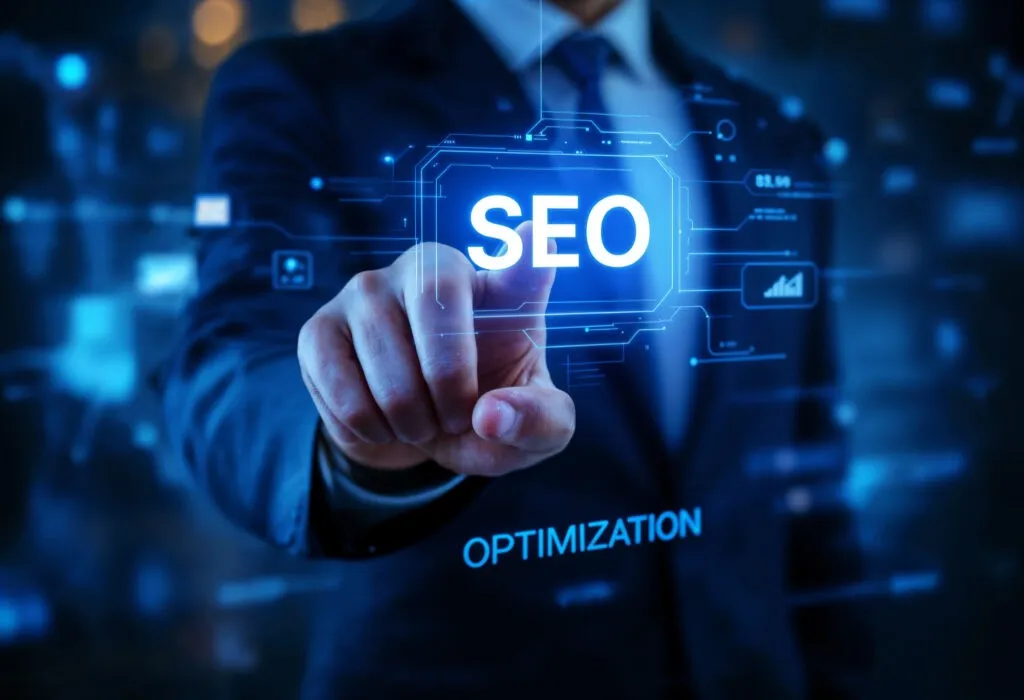India's Best SEO Services. Calculate Your Exact Cost
Fill the exact details and get estimated cost
SEO Services
Boost your online visibility, drive organic traffic, and achieve higher rankings on search engines with our professional SEO Services. At Relocation Service, we provide tailored SEO strategies that align with your business goals, ensuring long-term growth and sustainable results.
Search Engine Optimization (SEO) is the process of optimizing your website to rank higher on search engines like Google, Bing, and Yahoo. In today’s competitive digital world, being on the first page of search results is essential to capture customer attention and build trust. SEO helps businesses: We follow a structured and result-driven SEO process to ensure maximum visibility for your business: What is SEO and why does my business need it? How long does SEO take to show results? What is the difference between SEO and SEM? What is On-Page SEO? What is Off-Page SEO? What is Technical SEO? What are keywords in SEO? What are long-tail keywords? What are backlinks? What is Local SEO? How does mobile optimization affect SEO? What is a meta title and description? What is schema markup? What are SEO audits? Can SEO guarantee #1 rankings? What is SEO and why is it important for businesses? How long does it take to see results from SEO services? What types of SEO services do you provide? Do you guarantee #1 ranking on Google? How much do SEO services cost in India? What is on-page SEO? What is off-page SEO? What is technical SEO? What is local SEO? Why is keyword research important in SEO? Do you provide SEO reports? What are backlinks and why are they important? Do you provide content writing along with SEO? Can SEO help my small business grow? Is SEO better than paid ads? What are SEO-friendly URLs? Do you optimize websites for mobile SEO? Can you help recover a website from Google penalties? Do you offer e-commerce SEO services? What tools do you use for SEO? Do you provide international SEO services? What is voice search optimization? What industries do you serve with SEO? Can SEO help generate leads for my business? What is white-hat SEO? Do you provide SEO audits? How does SEO help increase website traffic? What is link building in SEO? Do you provide competitor analysis? Can SEO improve brand credibility? What is schema markup in SEO? How do you measure SEO success? Do you optimize for Google Maps ranking? Do you provide SEO for startups? What is mobile-first indexing? Do you provide SEO training? How often should SEO be done? What is content optimization in SEO? Can SEO help my website load faster? Do you provide multilingual SEO services? Is social media important for SEO? Can SEO help me rank in multiple cities? What is a meta description in SEO? Do you offer SEO for blogs? What is domain authority in SEO? Do you provide monthly SEO maintenance? What is the difference between SEO and SEM? Do you provide SEO for YouTube videos? What is bounce rate in SEO? Can SEO help reduce paid ad costs? Do you provide SEO for WordPress websites? Do you provide SEO for Shopify websites? Can SEO help increase sales? Do you offer SEO packages? How do search engines rank websites? What is anchor text in SEO? Do you provide guest posting services? What is keyword stuffing? Do you optimize websites for Core Web Vitals? Can SEO improve conversion rates? Do you offer enterprise SEO services? Do you offer SEO for hospitals and clinics? Do you provide travel SEO services? Do you provide SEO for real estate websites? Do you provide SEO for education websites? Do you optimize for featured snippets? Do you provide SEO for new websites? What is keyword difficulty? Do you optimize images for SEO? Do you provide SEO for law firms? Do you offer technical SEO fixes? Can SEO help rank on Bing and Yahoo? Do you provide competitor keyword research? What is CTR in SEO? Do you optimize websites for long-tail keywords? Do you provide SEO for B2B companies? What is SEO copywriting? Do you offer multilingual link building? Do you provide mobile app SEO? What is canonical tag in SEO? Do you provide SEO for startups on a budget? Can SEO help me get more customers? Do you provide industry-specific SEO strategies? Can SEO improve online reputation? What is robots.txt in SEO? Do you provide SEO for multilingual websites? What is sitemap in SEO? Do you provide link building for SEO? Can SEO help rank on Google Images? Do you provide SEO for SaaS businesses? Can SEO help build brand awareness? What is black-hat SEO? Do you fix duplicate content issues? Do you provide local citation building? Do you provide SEO for NGOs and non-profits? Do you provide SEO for multi-location businesses? Do you optimize websites for mobile apps promotion? Do you provide SEO for WordPress blogs? What is alt text in SEO? Do you provide Google penalty recovery services? Do you offer SEO-friendly web design? What is search intent in SEO? Can SEO help rank on Google News? How much do SEO services cost? Why does SEO take time? What is White Hat SEO? What is Black Hat SEO? What is Grey Hat SEO? What is E-A-T in SEO? What is the role of content in SEO? How does blog posting help SEO? What is duplicate content in SEO? What is SEO-friendly content? What is CTR in SEO? What is bounce rate in SEO? What is dwell time? What is link building in SEO? What is the difference between dofollow and nofollow links? What is Domain Authority (DA)? What is Page Authority (PA)? What is keyword density? What is LSI in SEO? What is search intent? What is organic traffic? What is paid traffic? What is referral traffic in SEO? What is direct traffic? What is voice search SEO? How does site speed affect SEO? What is Core Web Vitals in SEO? What is mobile-first indexing? What is HTTPS and why does it matter in SEO? What is crawl budget in SEO? What are broken links in SEO? What is robots.txt in SEO? What is an XML sitemap? What is canonicalization in SEO? What is anchor text in SEO? What is image SEO? What is video SEO? What is international SEO? What is multilingual SEO? What is hreflang in SEO? What is negative SEO? What is SEO penalty? What is disavow in SEO? What is Google Algorithm? What are Google Algorithm updates? What is RankBrain in SEO? What is BERT in SEO? What is mobile SEO? What is SEO copywriting? What is keyword cannibalization? What is thin content in SEO? What is duplicate title tag issue? What is pagination in SEO? What is site architecture in SEO? What is breadcrumb navigation in SEO? What is internal linking in SEO? What is external linking in SEO? What is user experience (UX) in SEO? How does social media affect SEO? What is content marketing in SEO? What is pillar content in SEO? What is a content cluster in SEO? What is SEO reporting? What is ROI in SEO? What is SEO for startups? What is SEO for e-commerce websites? What is SEO for small businesses? What is SEO for enterprises? What is voice search optimization? What are featured snippets in SEO? What is People Also Ask in SEO? What is SEO competitor analysis? What is keyword research in SEO? What is content gap analysis in SEO? What is SEO content strategy? What is A/B testing in SEO? What is CTR optimization in SEO? What is image alt text in SEO? What is Google Search Console in SEO? What is Google Analytics in SEO? What is Ahrefs in SEO? What is SEMrush in SEO? What is Moz in SEO? What is Screaming Frog in SEO? What is Yoast SEO in WordPress? What is SEO migration? What is negative keyword in SEO? What is SEO roadmap? What are KPIs in SEO? What is holistic SEO? What is evergreen content in SEO? What is seasonal SEO? What is geo-targeting in SEO?What is SEO and Why Does It Matter?
Our SEO Approach
Why Choose Us for SEO Services?
Types of SEO Services We Offer
Benefits of SEO for Your Business
Industries We Serve with SEO
And more.FAQ’s
SEO (Search Engine Optimization) improves your website’s visibility in search engines, helping you attract more qualified visitors, generate leads, and grow sales without paid ads.
SEO is not instant—it usually takes 3–6 months to see meaningful improvements, depending on competition, website status, and industry.
SEO focuses on organic traffic, while SEM (Search Engine Marketing) includes paid ads like Google Ads. SEO is long-term, SEM is immediate but short-lived.
On-Page SEO optimizes elements on your website, such as content, meta tags, URLs, headings, and images for better search rankings.
Off-Page SEO includes external signals like backlinks, social mentions, and directory listings that influence your website’s authority.
Technical SEO ensures your site is crawlable, fast, mobile-friendly, and structured properly for search engines.
Keywords are the terms people search for in Google. Using the right ones helps your website appear in relevant searches.
Long-tail keywords are specific phrases like “best SEO company in Delhi” that bring targeted traffic with less competition.
Backlinks are links from other websites pointing to your site, boosting authority and rankings.
Local SEO helps businesses rank in location-based searches and appear on Google Maps.
Google prioritizes mobile-friendly sites. Without optimization, your rankings can drop.
These are snippets shown in search results. Well-optimized titles and descriptions increase click-through rates.
Schema is structured data that helps Google display rich results like ratings, FAQs, and product details.
An SEO audit checks your website’s SEO health, including on-page, off-page, and technical factors.
No ethical SEO provider can guarantee rankings because search algorithms constantly change.
SEO (Search Engine Optimization) is the process of improving a website’s visibility on search engines like Google. It helps businesses attract more traffic, leads, and customers online.
SEO is a long-term strategy. It usually takes 3–6 months to see noticeable improvements, depending on competition and industry.
We offer on-page SEO, off-page SEO, technical SEO, local SEO, e-commerce SEO, content optimization, and link building services.
No ethical SEO agency can guarantee #1 rankings. We focus on sustainable strategies that deliver long-term results.
SEO pricing varies depending on project scope, competition, and keywords. On average, monthly SEO services in India can range from ₹10,000 to ₹50,000 or more.
On-page SEO refers to optimizing website content, meta tags, headings, images, and internal linking for better rankings.
Off-page SEO focuses on link building, brand mentions, guest blogging, and other strategies outside your website to improve authority.
Technical SEO improves site structure, speed, mobile-friendliness, indexing, and crawlability for better search engine performance.
Local SEO helps businesses rank for location-based searches like “near me” or “in [city]” to attract local customers.
Keyword research helps identify what your customers are searching for, so your website can rank for the right terms.
Yes, we provide detailed SEO reports with keyword rankings, traffic data, and progress updates.
Backlinks are links from other websites to your site. They help build authority and improve rankings.
Yes, we create SEO-friendly blogs, landing pages, and website content to improve visibility and engagement.
Yes, SEO is one of the most cost-effective ways for small businesses to compete online and attract customers.
SEO provides long-term organic results, while paid ads give instant but temporary traffic. A mix of both is ideal.
SEO-friendly URLs are clean, short, keyword-rich, and easy for users and search engines to understand.
Yes, we ensure your site is mobile-friendly, fast, and responsive, which is crucial for SEO success.
Yes, we provide penalty recovery services by identifying issues and applying corrective SEO strategies.
Yes, we optimize product pages, categories, schema, and shopping features for e-commerce websites.
We use tools like Google Analytics, Google Search Console, SEMrush, Ahrefs, and Screaming Frog.
Yes, we optimize websites for global audiences with multilingual and multi-regional SEO strategies.
Voice SEO involves optimizing for conversational queries people use on devices like Alexa, Siri, and Google Assistant.
We provide SEO for all industries including healthcare, education, travel, e-commerce, real estate, and IT.
Yes, SEO improves your visibility among potential customers, resulting in more inquiries and leads.
White-hat SEO follows ethical and Google-approved practices to build long-term rankings safely.
Yes, we perform comprehensive SEO audits to identify strengths, weaknesses, and opportunities.
SEO improves your site’s visibility in search results, attracting more organic visitors.
Link building is acquiring quality backlinks from authoritative sites to improve rankings.
Yes, we analyze your competitors’ SEO strategies to build stronger campaigns for your business.
Yes, ranking higher on Google makes your brand appear more trustworthy and reliable.
Schema markup is code added to a website to help search engines understand and display rich results.
We track rankings, organic traffic, leads, and ROI to measure success.
Yes, we optimize Google Business Profiles for better local visibility.
Yes, we create cost-effective SEO strategies for startups to grow online.
Mobile-first indexing means Google ranks websites based on their mobile version first.
Yes, we offer SEO training and consulting for businesses who want in-house expertise.
SEO is an ongoing process. Continuous updates are needed to maintain rankings.
Content optimization ensures web pages are keyword-rich, engaging, and aligned with user intent.
Yes, technical SEO includes optimizing speed and performance.
Yes, we optimize websites for multiple languages and regions.
Social signals indirectly influence SEO by boosting visibility and engagement.
Yes, with local SEO and city-specific landing pages, we help rank in multiple locations.
A meta description is a short summary shown under your website link in Google results.
Yes, we optimize blog posts with keywords, headings, and internal links for better reach.
Domain Authority (DA) is a score that indicates how strong and trustworthy a website is.
Yes, we offer ongoing SEO maintenance to keep rankings stable.
SEO is organic optimization, while SEM includes paid ads like Google Ads.
Yes, we optimize YouTube titles, descriptions, tags, and thumbnails for better rankings.
Bounce rate is the percentage of visitors who leave your site without taking any action.
Yes, strong SEO reduces dependency on paid ads over time.
Yes, we specialize in optimizing WordPress websites with plugins like Yoast and RankMath.
Yes, we optimize Shopify stores for better visibility and conversions.
Yes, SEO drives targeted traffic that leads to more sales and revenue.
Yes, we have customized SEO packages based on business needs.
Search engines rank websites based on relevance, content quality, links, and user experience.
Anchor text is the clickable text in a hyperlink, important for SEO relevance.
Yes, we create high-quality guest posts for backlinks and branding.
Keyword stuffing is overusing keywords unnaturally, which harms SEO.
Yes, we improve site speed, interactivity, and stability for better rankings.
Yes, SEO attracts the right audience, improving leads and conversions.
Yes, we manage large-scale SEO projects for enterprises.
Yes, we help healthcare providers attract patients with SEO.
Yes, we optimize travel and tourism websites for bookings and leads.
Yes, we optimize real estate websites for property searches and leads.
Yes, we help schools, colleges, and ed-tech platforms rank higher.
Yes, we optimize content to capture position zero in Google.
Yes, we help new websites build visibility and authority from scratch.
Keyword difficulty measures how hard it is to rank for a keyword.
Yes, we compress, rename, and add alt text to images.
Yes, we help lawyers and firms attract clients through SEO.
Yes, we resolve crawl errors, redirects, site speed, and indexing issues.
Yes, SEO improves rankings across multiple search engines.
Yes, we find keywords your competitors are ranking for and target them.
CTR (Click Through Rate) is the percentage of people who click your link in search results.
Yes, long-tail keywords bring targeted and high-converting traffic.
Yes, we create strategies for B2B lead generation.
SEO copywriting involves creating content optimized for search engines and readers.
Yes, we build backlinks in different languages.
Yes, we optimize app landing pages and app store listings.
A canonical tag prevents duplicate content issues by specifying the preferred page.
Yes, we have affordable SEO packages for startups.
Yes, SEO brings in people actively searching for your services.
Yes, we customize SEO for different industries and niches.
Yes, SEO helps positive content rank higher, improving reputation.
Robots.txt is a file that tells search engines which pages to crawl or avoid.
Yes, we optimize content for multiple languages.
A sitemap helps search engines crawl and index website pages.
Yes, we build high-quality backlinks from relevant sites.
Yes, optimizing images can help your website rank in Google Images.
Yes, we help SaaS companies rank for competitive keywords.
Yes, SEO increases online visibility and recognition.
Black-hat SEO uses unethical tactics that can harm rankings.
Yes, we resolve duplicate content with canonicalization and redirects.
Yes, we build citations in business directories for local SEO.
Yes, we help NGOs improve online visibility and donations.
Yes, we optimize websites for multiple branches or locations.
Yes, we optimize content and app store SEO.
Yes, we optimize posts with keywords, meta tags, and internal links.
Alt text describes images for search engines and accessibility.
Yes, we help websites recover from algorithm penalties.
Yes, we design websites that are SEO-optimized from the start.
Search intent is the purpose behind a user’s search query.
Yes, we optimize content for Google News inclusion.
SEO costs vary widely—monthly packages, hourly consulting, or project-based fees are common.
Search engines need time to crawl, index, and evaluate changes. Also, competition levels affect results.
Ethical SEO methods that follow search engine guidelines, ensuring long-term stability.
Unethical SEO tricks (keyword stuffing, buying links) that may give short-term gains but risk penalties.
A mix of White and Black Hat tactics—not recommended for sustainable growth.
Expertise, Authoritativeness, and Trustworthiness—Google uses this to evaluate content quality.
High-quality, keyword-rich, and valuable content is the backbone of SEO.
Regular blogs keep content fresh, attract backlinks, and target new keywords.
Duplicate content confuses search engines and may harm rankings. Unique content is always best.
Content optimized with keywords, headings, readability, and user intent in mind.
Click-Through Rate (CTR) is how often people click your result vs. how many times it appears. Higher CTR = better rankings.
The percentage of users who leave after viewing only one page. A high bounce rate may hurt rankings.
The time users spend on your page before returning to search results. Longer dwell time signals good content.
The process of earning quality backlinks from other websites to improve authority.
Dofollow links pass SEO value, while nofollow links don’t. Both can still bring traffic.
A Moz metric (0–100) that predicts how likely your site will rank on Google.
Similar to DA, but measures ranking potential of a single page.
The percentage of times a keyword appears in content. Overuse (keyword stuffing) is harmful.
Latent Semantic Indexing—related keywords that give context to your content.
The goal behind a search (informational, navigational, transactional). Matching intent is crucial.
Visitors coming from unpaid search results.
Visitors who arrive via paid ads (Google Ads, social media ads).
Traffic from links on other websites.
Visitors who type your website URL directly into the browser.
Optimizing content for voice assistants like Alexa, Siri, and Google Assistant.
Faster websites improve user experience and rankings. Slow sites may lose visitors.
Google’s performance metrics: loading speed, interactivity, and visual stability.
Google primarily uses your mobile site version for ranking.
Secure websites (HTTPS) are favored by Google and build user trust.
The number of pages Googlebot crawls on your site. Optimizing site structure ensures better crawling.
Links that lead to 404 errors. Too many broken links hurt SEO.
A file that tells search engines which pages to crawl or ignore.
A file listing all important website pages for search engines.
Using canonical tags to prevent duplicate content issues.
Clickable text in a hyperlink. Optimized anchor text improves relevancy.
Optimizing image file names, alt text, and size to rank in image search.
Optimizing videos with titles, tags, transcripts, and hosting platforms like YouTube.
Optimizing your site to rank in different countries and languages.
Optimizing a website for multiple languages.
A tag used to tell Google about language and regional targeting.
Malicious practices (spammy backlinks, hacking) done to harm a competitor’s ranking.
Google penalties for violating guidelines, leading to ranking drops.
A Google tool to reject spammy or harmful backlinks.
A set of rules that determine website rankings in search results.
Regular changes (like Panda, Penguin, Hummingbird) that impact rankings.
Google’s AI that helps interpret search queries and user intent.
A Google update that better understands natural language searches.
Optimizing websites for mobile users and search engines.
Writing content that is engaging, valuable, and optimized for keywords.
When multiple pages target the same keyword, competing with each other.
Pages with little to no useful content. Thin content hurts rankings.
When multiple pages share the same meta title, confusing search engines.
Handling multi-page content properly for crawling and indexing.
The way your website pages are structured and linked together.
A trail of links that helps users and search engines understand site hierarchy.
Links within your website that connect related pages for better navigation and SEO.
Links from your site to other authoritative websites.
How easy and satisfying it is for users to interact with your site.
Social shares indirectly boost SEO by increasing visibility and backlinks.
Creating valuable content to attract traffic and improve rankings.
Comprehensive, detailed content that acts as a hub for related topics.
A group of related articles linked to pillar content.
A report showing rankings, traffic, backlinks, and performance metrics.
Return on Investment—measuring revenue compared to SEO spend.
Tailored strategies to help new businesses build visibility quickly.
Optimizing product pages, categories, and schema for better sales.
Cost-effective SEO targeting local customers and service-based queries.
Large-scale SEO strategies for corporations with multiple websites.
Adapting content to conversational, long-tail queries spoken by users.
Highlighted results at the top of Google search. Optimizing FAQs often helps.
A Google feature that shows related questions. Optimizing FAQs can help your site appear there.
Studying competitor websites to identify keyword and backlink opportunities.
Finding the best keywords that your audience is searching for.
Identifying topics your competitors cover but you don’t.
A plan to create and optimize content for rankings and conversions.
Testing variations of pages to see which performs better in rankings and conversions.
Improving your titles and descriptions to increase clicks.
Text describing images for accessibility and search engines.
A free tool to monitor search performance, indexing, and errors.
A tool to track traffic, conversions, and user behavior.
An SEO tool for backlinks, keyword research, and competitor analysis.
A powerful SEO suite for keyword tracking, site audits, and competitor analysis.
An SEO platform for keyword tracking, site analysis, and link building.
A tool that crawls websites to detect SEO issues.
A plugin to optimize content, meta tags, and sitemaps easily.
Optimizing and transferring SEO value during website redesigns or domain changes.
(Not in SEO, but in PPC)—keywords you exclude from targeting.
A step-by-step plan to implement SEO strategies over time.
Key Performance Indicators like traffic, conversions, keyword rankings, and ROI.
A complete approach—covering technical, content, and user experience.
Content that stays relevant for years (e.g., guides, FAQs).
Optimizing content for seasonal trends (festivals, sales, events).
Optimizing for location-based keywords to attract local customers.
Request A Quote
Our Tech Services
Our Logistics Services
Get a Call Back Instantly
Experience the fastest and smartest way to get connected with us. Get free quotes instantly for all Logistic & Tech Services.
Customer Success Stories
Long established fact that a reader will be distracted by the readable content of a page when looking at it's layout. The point of using Lorem Ipsum
Allien John Copy
CustomerLong established fact that a reader will be distracted by the readable content of a page when looking at it's layout. The point of using Lorem Ipsum
Jack Daniel
Building OwnerLong established fact that a reader will be distracted by the readable content of a page when looking at it's layout. The point of using Lorem Ipsum
Victoria Porter
CustomerFAQ's
SEO (Search Engine Optimization) is the process of improving your website to rank higher on search engines like Google. It helps increase visibility, drive organic traffic, and generate more leads for your business.
SEO is a long-term strategy. Typically, it takes 3 to 6 months to see noticeable improvements depending on your website’s current status, competition, and industry.
On-page SEO involves optimizing your website’s content, keywords, meta tags, and structure. Off-page SEO focuses on external factors like backlinks, social signals, and domain authority.
Yes, SEO and paid ads work best together. While ads give quick results, SEO builds long-term visibility and organic traffic without ongoing ad costs.
We conduct in-depth keyword research using tools and competitor analysis to identify high-traffic, low-competition, and business-relevant keywords that attract your target audience.
No ethical SEO company can guarantee #1 rankings, as search results depend on algorithms and competition. However, we use proven strategies to maximize visibility and ranking potential.
Backlinks are links from other websites pointing to yours. They act as votes of trust and authority, helping your site rank higher in search results.
Yes, SEO is one of the most cost-effective ways for small businesses to compete with larger brands and attract local or niche-specific customers.
Local SEO focuses on improving visibility for location-based searches, like “SEO services near me.” It is essential for businesses serving specific cities or regions.
We provide detailed SEO reports with rankings, traffic, keyword growth, and performance metrics so you can monitor ROI and improvements.





























